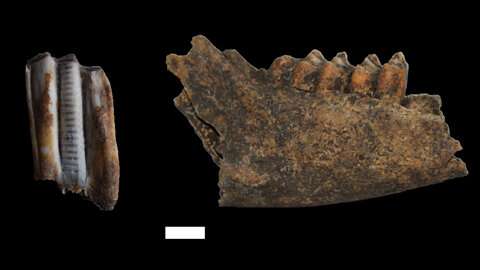This article has been reviewed according to Science X's editorial process and policies. Editors have highlighted the following attributes while ensuring the content's credibility:
fact-checked
peer-reviewed publication
trusted source
proofread
Specialization in sheep farming helped Neolithic communities in the Adriatic expand throughout the Mediterranean: Study

The specialization in sheep farming in the early Neolithic populations of Dalmatia, Croatia, may have been related to the rapid expansion of these communities and the spread of agriculture throughout the central and western Mediterranean. This is suggested by a study led by the UAB and the CNRS, which also represents a methodological innovation in the study of prehistoric flocks. The research was recently published in Scientific Reports.
The spread of agriculture in the central and western Mediterranean took place rapidly. The first peasants, coming from the Adriatic, spread westwards across the Mediterranean to the Iberian Peninsula approximately 8,000 years ago. Studying these societies provides insight into how they organized and expanded. It is known that they had an economy based on cereal agriculture and sheep and goat farming, but there is little information on how this agropastoral system worked.
The study investigated pastoral practices and the use of animal products in the Eastern Adriatic region, specifically in the Dalmatian sites of Tinj-Podlivade and Crno Vrilo. It was carried out by a team of researchers led by Alejandro Sierra, researcher at the Department of Prehistory of the UAB and the Natural History Museum of Paris, CNRS.
Researchers demonstrate that the early farmers at both sites specialized in sheep farming—and not sheep and goats as previously thought—with early pastoral practices and the use of products such as milk and meat from these ruminants. Most of the births at both sites were concentrated in early winter, probably in an attempt to organize the annual agropastoral calendar.
The results suggest that there was a common animal economy at both sites, which could be related to the mobility practiced by these early agricultural societies throughout the Mediterranean.
The rapid spread across the central and western Mediterranean probably occurred by sea, according to archaeological records found on different islands. "Sheep specialization may have had to do with an anticipatory mobility strategy, in which population groups carried out planning adapted to navigation in order to increase their chances of success, focusing on a species with many advantages, both for movement and settlement," says Alejandro Sierra.
For the first time, the research combined zooarchaeology, palaeoproteomics and stable isotopes to demonstrate the main composition of the herds and their management. "It is not only a historical finding, but also a methodological innovation," Sierra points out.
"It will be important to examine other sites around the Adriatic with the same methods to assess whether our results are specific to these two Dalmatian sites or represent a coherent pattern of Early Neolithic animal management across the region," the UAB researcher concludes.
More information: A. Sierra et al, Early Dalmatian farmers specialized in sheep husbandry, Scientific Reports (2023). DOI: 10.1038/s41598-023-37516-z
Journal information: Scientific Reports
Provided by Autonomous University of Barcelona



















